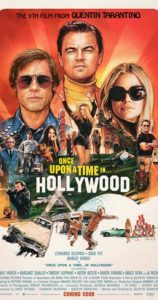
Overlong, meandering, and dull—except for the ten minutes of killin’ at the end—Tarantino’s new Tarantino movie, Once Upon a Time… in Hollywood, is one of his weakest, the kind of movie made by a filmmaker so confident that everything he touches is gold, he barely bothers to put in any effort. And why should he? The only debate in reviews I’ve read appears to be where, among his masterpieces, his new masterpiece should be placed.
I admit I am baffled by the world of Tarantino Kool-Aid drinkers. For them, and they are rife in the world of movie obsessives and movie reviewers, nothing he has touched has been anything less than genius. For them, the only question one asks of his movies is what variety of genius they represent. Tarantino himself agrees entirely with this assessment of his work, and has of late been granting interviews left and right in which he claims to be retiring following his 10th movie (this is his 9th), to ensure that his legacy remains untarnished by the lesser works of an aging filmmaker. (Maybe he’s never seen 75-year-old Akira Kurosawa’s Ran?)
The unspoken assumption being that Tarantino’s never made a bad movie—never made anything less than a masterpiece—and that, surely, his last film, whatever it is, will be equally monumental (unless it’s Star Trek, in which case the rules say he gets to make another one).
What can I say? I don’t get it. His most ardent fans seem willing only to say that maybe The Hateful Eight didn’t live up to his usual standards of genius. The Hateful Eight is the only recent Tarantino movie I more or less found amusing, despite its many, many irritating Tarantinoisms. So there we are.
Once Upon a Time… in Hollywood is similar to Inglourious Basterds and Django Unchained in that it presents a world based not on the past, but on the the past as represented in past movies. Tarantino doesn’t make movies set in our world. He makes violent cartoons set in the world of movies.
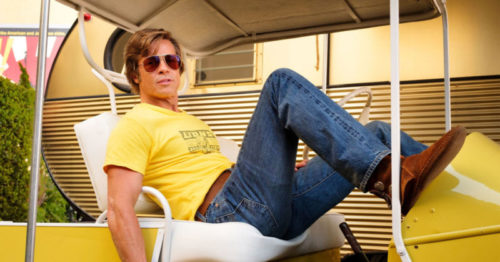
We are told that Once Upon a Time is set in 1969 Los Angeles, and we know this from the excess of movies posters, music, commercials, movie trailers, dog food cans, cars, hairstyles, clothes, etc. But this is a cartoon of 1969. Not a bit of it feels like 1969. Not a bit of it feels real. There’s no sense of time or place outside of movie-time.
The film is centered on aging cowboy actor Rick Dalton (Leonardo DiCaprio), known for a lot of cheesy westerns and action movies, and, most recently, television western Bounty Law. We’re shown a few scenes from Bounty Law. They look nothing like early ‘60s television. DiCaprio couldn’t be more out of place. It’s like he’s in on the gag, somehow. Only why is it a gag? And what is the gag?
This is something I don’t understand with Tarantino. He sets his movie in this era, with these kind of TV shows and movies, with this kind of imagined actor, because he loves this stuff. He absolutely adores these kinds of movies, the kind he’s endlessly referencing in his own movies. This is the era he wishes he was old enough to have taken part in while it was happening. So why does it so often feel like he’s making fun of it? Is Tarantino’s love of this era ironic? Does he love these movies, TV shows, actors, etc. because he thinks they’re goofy and ridiculous?
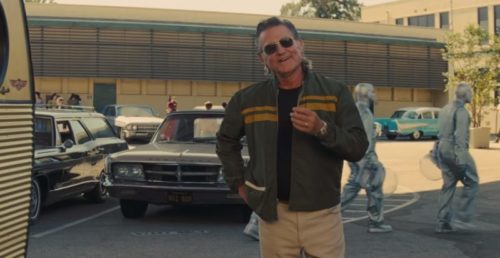
Worse than Bounty Law, much worse, is a new TV show Dalton’s guest-starring in, Lancer. We get to watch a scene from it that goes on, and on, and on, to the point of absurdity. It’s dull, it’s badly acted, I guess on purpose, but not comically. It’s just there, flat and empty. Finally Dalton blows a line. Aha, so that’s the purpose of the scene. Why, then, do we need to watch ten minutes of it?
Dalton plays the heavy in this show. In another endless scene, Dalton threatens an eight-year-old girl with a gun. Once again, he seems to be a hammy actor giving a hammy performance. But at the end of the scene, everyone tells him he was stunning, much to his relief. I have no idea how to read this scene. Is it ironic? That he’s a hambone people are sucking up to? Or is the point that he really is a great actor, he’s just stuck in crummy TV shows? The character is obviously based on Burt Reynolds, an actor Tarantino surely loves, so is he making fun of Reynolds? Or is he trying to show that he was, in fact, a great actor? I wish I could tell.
In this same scene, Dalton, improvising, throws the eight-year-old girl to the floor. After the cut he asks if she’s okay. She sure is! She’s got arm pads on! She’s a true pro, as she explains in an earlier scene.
I don’t usually drag a filmmaker’s real life baggage into their movies, but in this case, how am I not supposed to be reminded of recent footage of Uma Thurman injuring herself behind the wheel on an unsafe stunt car Tarantino made her drive during Kill Bill? Is this scene his dig at Uma for complaining?
Still more eye-widening is Dalton’s best friend and stunt double, Cliff Booth (Brad Pitt). He’s the heart of the movie, the hero. Pitt gives a great performance, one of his best. Playing a taciturn, over-the-hill tough guy with a knowing grin appears to be right in his sweet spot. He’s the heart, he’s the hero, and we learn exactly one thing about his past: He murdered his wife and got away with it.
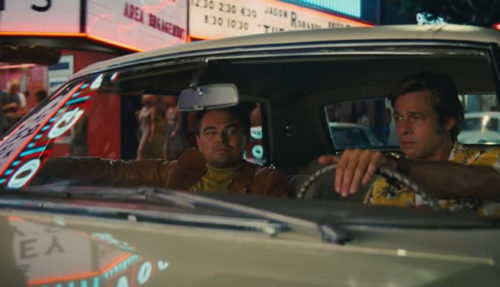
How is one meant to feel about this? As played in the movie, it’s just another gag. Just one of those crazy things those crazy guys we used to love once did. We are, without question, meant to love Cliff.
What does that say about this movie? Here comes a spoiler of the film’s end, so be warned. As is Tarantino’s wont, he changes history by having Manson’s murdering asshole hippies go not to Sharon Tate’s house, but to the house next door—Dalton’s. Oops. Who should be there but Cliff, who whups ass on them with an assist from Dalton (in the one satisfyingly over-the-top scene the movie has to offer).
So. In the Tarantino fantasy version of history, the day is saved by a wife-murderer and an aging cowboy actor. Is he purposefully thumbing his nose at the #metoo movement? Or is it merely accidental?
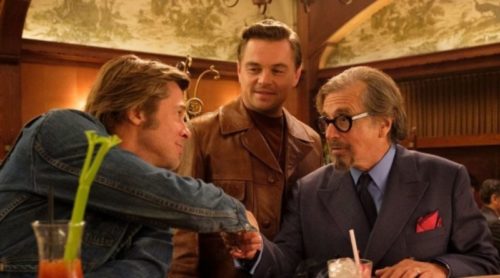
Critics appear to think the Dalton character is a stand-in for Tarantino, that, like Dalton, Tarantino, growing older, fears irrelevance, and the movie is a meditation on his own soon-to-be-retired career.
But how does that track? According the press and the fans and Tarantino himself, he’s at the top of his game. His situation is not remotely similar to Dalton’s. What, then, is this movie about?
I have no idea. Yes, there’s an actor dealing with a fading career, and he’s doing it at the end of an era, marked by the Manson murders. Only Dalton saves the day there, so actually his career isn’t over. Is it? So it’s a movie about a fading star whose star doesn’t fade, because history played out right this time, with the old guard macho male wife-murdering types being heroes and going on to continued fame. Maybe? Or is it that hippies represent the coming liberalism soon to oust macho guys from their place at the top, but because the only hippies in the movie are Manson’s tribe of sexy murderers, hippie idealism is a con?
Or then again, is it all the hallucination of the wife-murderer? Notably, before the finale, Cliff smokes a cigarette dipped in liquid LSD. Maybe the rewrite of history is just in Cliff’s imagination. Maybe his and Dalton’s seeming heroism is all in his mind, the last dream of a man whose time in the spotlight, or at least his time standing next to the spotlight, is coming to its inevitable end. This strikes me as the best possible reading of the end, so I think I’ll choose to believe it.
And if we’re going to follow that thread, then the whole movie should be viewed as being told from Cliff’s point of view. This would at least make a kind of sense. An aging tough-guy wife-murderer would indeed have just these opinions about hippies and his own coming extinction, and would indeed dream of murdering the lot of them. In that sense, I guess he lucks out in meeting Manson’s nut-jobs, allowing his hippie-killing fantasy to involve the actual worst hippies ever.
Then again, the more I think about this, the less sense any of it makes. In short, this is a movie celebrating Cliff and Dalton and their groovy tough guy attitudes, and lamenting that their day has come and gone.
Unlike most of his other work, Once Upon a Time is remarkably free of drama. Mostly it is just Dalton and Cliff kinda doing stuff. Some of which is diverting. A lot of which isn’t. Famous actors show up, but so fast you’ll miss them if you blink. If you’re curious to see Pacino doing a Tarantino movie, I hope you enjoy his three minutes of screen time. Same goes for Bruce Dern, Kurt Russell and the rest. (Though Russell returns at jarring intervals as the voice of the narrator.)
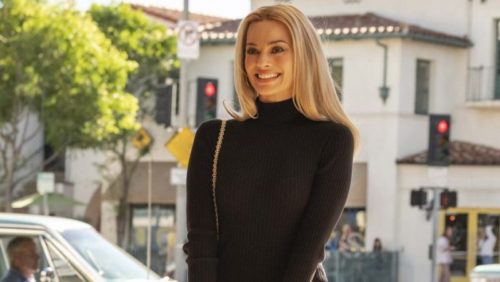
Margot Robbie plays Sharon Tate. At first, Tate and Roman Polanski (Rafał Zawierucha) appear to be the movie’s other thread. We’re treated to them partying at the Playboy Mansion, to Polanski eating breakfast, and to Sharon ducking into a movie theater to watch herself in The Wrecking Crew. Sharon shows up a couple more times, but only to remind as that she’s going to be murdered (but not really; we know how Tarantino rolls with history). She’s essentially forgotten by the end of the movie, playing no part whatsoever in history’s rewriting. This isn’t her dream, it’s Cliff’s.
Meandering, introducing characters and threads that go nowhere, existing only to play around in a past era, a movie like that can get by if it isn’t boring. Once Upon a Time is largely boring. Which perhaps sums up my feelings better, and with considerably less verbiage, than all of the preceding. I at least expect some pizazz in a Tarantino movie. In plotting, character, humor, and meaning, this one is just lazy.

Agree entirely. I had to satisfy my curiosity so I paid to see it. Gawd, what a mess! Here’s another question to add to yours: what motivation does Cliff have to go see the Bruce Dern character in the first place? I mean, yeah, I can see him taking a drive down there when he picks up the hippie girl and she wants to go there. But when he sees it’s creepy and potentially dangerous why does he insist on going in? This made zero sense to me. Pitt turns from slacker dude into badass dude, why? Oh, just because.
This is the kind of basic character backstory/development issue that the movie never bothers to even try with. I walked out when Cliff was starting to beat up the hippie guy for slashing his tire. I knew the sadism was just getting going, and I didn’t need it cluttering up my brain. (There was another bit of total nonsense in this scene: he’s upset at the hippie for slashing his tire because he’s worried about the condition of the car, yet he chooses to throw the guy against the car, which (as we’ve seen in the Bruce Lee scene) could easily do far more damage. I gIve up!)
There were two scenes I liked. One was between the 8 year-old girl and Dalton. Even though I never quite believed it, I still liked seeing Dalton confront his failures through this conversation about the pulp novel he was reading. And I enjoyed the scene where Dalton throws a fit after blowing his lines. But, boy, was that a lot of drek to sit through just for a couple of decent scenes.
This was super dull and self-indulgent.
But, your theory about it all being in the mind of Cliff tracks with the end of Once Upon a Time in America, so maybe?
But this movie was balls. It was 50% shots of people driving. I have no idea why people like this clown.
How shiny all the vintage cars were!
I finally watched this after a friend recommended it, and I felt like I might have missed something. But I don’t think I did, because your review is spot on. The film feels felt QT tasked his AD to execute his vision based on a bunch of notes made on napkins while drinking margaritas at El Coyote. It had moments of spark and potential but nothing developed. The script gave its two leads nothing to do.
I was mildly entertained by a few scenes, but the tone is so disjointed. And yes, the depiction of 50s and 60s performances was anachronistic and jarring, as was the production scenes in which the production environment disappeared for no apparent reason. They may have been intentional creative choices but the tone was too underdeveloped for the viewer to understand why those choices might have been made. I was disappointed and left wondering if QT is considering retirement because he suspects he has lost his passion for movie making. I’ve never been a huge fan of his but his earlier films were at least unique and memorable.
I like your theory on why he keeps talking about retiring. It feels much more psychologically plausible than all his stated bluster about it. He likes writing long talky scenes and reinventing history. Telling stories, if he was ever into it, has fallen by the wayside. Once Upon A Time really did feel lazy in that way, just a concept he liked and some scenes he liked, where tying it together was an afterthought he never bothered to think. He may just not have the energy anymore. For me, his best is still Reservoir Dogs.
The Manson family weren’t hippies. Why does every dope think that anyone with long hair was a hippie? The hippies were about peace and love. Does that sound like the Manson family?